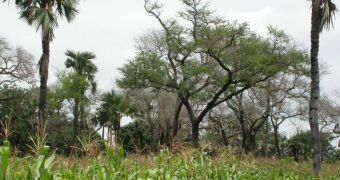Renowned scientists speaking at the 2010 World Food Prize Borlaug Dialogue, in De Moines, Iowa, have teamed up to promote a brand new solution to improve crops and store carbon dioxide at the same time.
Our world today needs a radical transformation in the agricultural sector, so that it can deal with climate change, ensure enough food for the ever growing population, and sustainability.
“Doubling food production by mid-century when so many of the world's soils are depleted and we are faced with a changing climate cannot be achieved with business-as-usual conventional agriculture,” said Dr Dennis Garrity, Director General of the World Agroforestry Center.
“We need to reinvent agriculture in a sustainable and affordable way so that it can adapt to climate change and reduce its emissions of greenhouse gases.”
Professor MS Swaminathan, 1987 World Food Prize Laureate and founder of the MS Swaminathan Research Foundation added that “novel solutions and technological advances must be married with ecological thinking to drive a truly sustainable agricultural revolution.”
Dr Garrity and Professor MS Swaminathan, are the main supporters of this Evergreen Agriculture concept, that integrates fertilizer trees into annual food crop and livestock systems, thus sustaining a green cover on the land throughout the year.
The trees draw nitrogen from the air and transfer it into the soil through their roots and leaf litter, thus restoring exhausted soils, and boosting crop yields and farmers incomes.
This is what they actually call a 'fresh out of the box solution', which has already proven its efficiency in some African countries, as Garrity and co-authors say in a new article published in the Journal of Food Security.
In Zambia, Malawi, Niger and Burkina Faso, evergreen agriculture has shown positive results: the soils are nourished and become productive again, and the farmers finally have some benefits from their work.
In Malawi, farmers have increased their maize yields by nearly 280%, thanks to one special fertilizer tree called Faidherbia albida, who sheds its leaves during the rainy season and is inactive during the crop-growing period, which is perfect for food crops.
In Niger for example, there are now over 4.8 million hectares of sorghum and millet being grown in agroforests and on each hectare, there are up to 160 Faidherbia trees.
Expanding evergreen agriculture is now the goal of several governments, research institutions and local and international development partners, like the IFAD, the EU, AGRA, the Gates Foundation and UNEP.
On the African continent “we are already working with 18 countries ... to develop national plans for implementation of evergreen agriculture,” said Garrity.
Next, the researchers plan to develop the technologies and adapt them to smallholder farming systems in different agricultural environments, so that more and more farmers can benefit from it.

 14 DAY TRIAL //
14 DAY TRIAL //